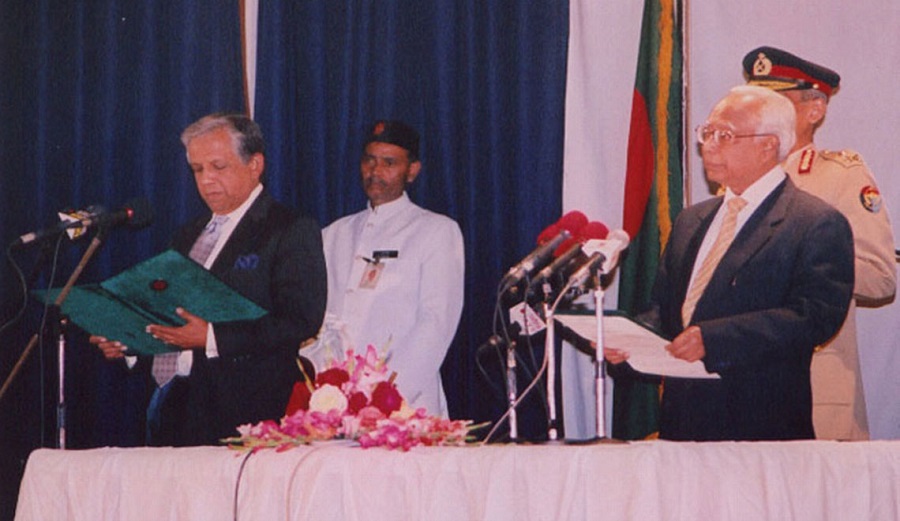
BBC Bangla recently ran a piece by Akbar Hossain on the foreign diplomatic manoeuvres in an uncertain Dhaka landscape after the BNP-Jamaat-e-Islami coalition government ended its term and was replaced by a caretaker administration.
Hossain has detailed the diplomatic maneuverers of the US, British and Canadian envoys and the one representing the UN. According to the article, they were all operating to correct the country’s many deficits — the trust deficit between the two major parties, the BNP and the Awami League, and their top leaders; the democracy deficit that was leading to situations in which the opposition parties were reluctant to contest in the polls; and the faith deficit in the army which had become a key player, but which BNP Chairperson Khaleda Zia felt would largely back her.
The article has detailed how the Western diplomats lobbied to put in place a second caretaker government with military backing and how then army chief Gen Moeen U Ahmed remained worried over the impact of the political crisis on the UN peacekeeping quota of the Bangladesh Army.
Be that as it may, the BBC story offers a few pointers. The West, especially the US, was behind the Minus Two formula aiming to drive Khaleda and Awami League President Sheikh Hasina out of the country’s political arena. The West was keen to use the military and controversial opportunistic elements of civil society to cobble together a non-political national government that would serve their interests and do their bidding in Dhaka.
No wonder, the caretaker overlooked their prime constitutional responsibility of holding elections at the soonest possible time so that the country would not have to suffer an absence of government. They sang and danced to a foreign tune until public angst forced an election. Late Indian president Pranab Mukherjee has recounted in his memoirs a fierce argument he had with former US secretary of state Hilary Clinton about the immediate need for elections in Bangladesh.
This falls in place with the BBC story that shows the Western diplomats playing their ‘democracy game’. Maybe the real agenda was to get in place a King’s Party, led by microcredit guru Md Yunus and legitimised by the military. India played a major role in pushing for elections in Bangladesh to a point the West could not deny it.
But the extra-constitutional or unconstitutional role played by the unelected caretaker, which turned Bangladesh into a playground of unseemly foreign maneuverers and severely undermined its sovereignty, must have influenced the subsequent Awami League decision to use its majority and scrap the caretaker arrangement.
If the leading democracies in the West and neighbouring India can do without a caretaker, so went the logic, Bangladesh jolly well can.
Since 2009, Bangladesh has had a stable government under the Awami League and it has outperformed many in economic and human development. The Islamist opposition has been on the streets often to score a point but flopped because the issues they have launched agitations with were frivolous but provocative.
“Bangabandhu statues are un-Islamic, Indian Prime Minister Narendra Modi is unwelcome, the French embassy must close down” — finally no sensible Bangladeshi wants to die for these issues, let alone burn alive in buses firebombed by opposition activists.
But the West, especially the US, sees them as foot soldiers of democracy in a desperate bid to rake up the democracy deficit issue to unsettle a strong, stable government. Not to suggest the Hasina government does not have its downsides and the Awami League has undergone some unwelcome transformation.
But Bangladesh is not what it was in the 1990s or even what it was in 2009. Its booming economy, inclusive growth and human development have given it confidence. So the West may try raising stinks to get back its leverage in a country but all that may not work anymore. But that does not mean the West, especially the US, and the NGOs it funds will give up.
The Asian Network for Free Elections, or ANFREL, is among 12 organisations strongly pitching for sanctions against Bangladesh security forces. It raised a stink before the last parliament polls for not allowing its delegation into the country. Several Asian countries have kept ANFREL away from entering their countries during polls, because it is funded from the US intelligence budget with funds kept aside for regime change operations. So we do know these noise-makers, they are not independent bodies but part of the US Deep State which seeks to bring down governments who don’t play footsie with them.




